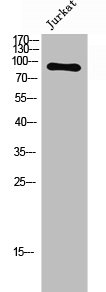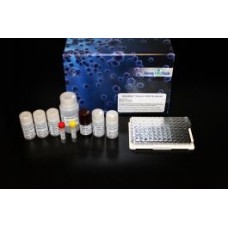FGFR4 Antibody, Biotin conjugated
CSB-PA008648LD01HU
ApplicationsELISA
Product group Antibodies
ReactivityHuman
TargetFGFR4
Overview
- SupplierCusabio
- Product NameFGFR4 Antibody, Biotin conjugated
- Delivery Days Customer20
- ApplicationsELISA
- CertificationResearch Use Only
- ClonalityPolyclonal
- ConjugateBiotin
- Gene ID2264
- Target nameFGFR4
- Target descriptionfibroblast growth factor receptor 4
- Target synonymsCD334, JTK2, TKF, fibroblast growth factor receptor 4, hydroxyaryl-protein kinase, protein-tyrosine kinase, tyrosine kinase related to fibroblast growth factor receptor, tyrosylprotein kinase
- HostRabbit
- IsotypeIgG
- Protein IDP22455
- Protein NameFibroblast growth factor receptor 4
- Scientific DescriptionTyrosine-protein kinase that acts as cell-surface receptor for fibroblast growth factors and plays a role in the regulation of cell proliferation, differentiation and migration, and in regulation of lipid metabolism, bile acid biosynthesis, glucose uptake, vitamin D metabolism and phosphate homeostasis. Required for normal down-regulation of the expression of CYP7A1, the rate-limiting enzyme in bile acid synthesis, in response to FGF19. Phosphorylates PLCG1 and FRS2. Ligand binding leads to the activation of several signaling cascades. Activation of PLCG1 leads to the production of the cellular signaling molecules diacylglycerol and inositol 1,4,5-trisphosphate. Phosphorylation of FRS2 triggers recruitment of GRB2, GAB1, PIK3R1 and SOS1, and mediates activation of RAS, MAPK1/ERK2, MAPK3/ERK1 and the MAP kinase signaling pathway, as well as of the AKT1 signaling pathway. Promotes SRC-dependent phosphorylation of the matrix protease MMP14 and its lysosomal degradation. FGFR4 signaling is down-regulated by receptor internalization and degradation; MMP14 promotes internalization and degradation of FGFR4. Mutations that lead to constitutive kinase activation or impair normal FGFR4 inactivation lead to aberrant signaling.
- ReactivityHuman
- Storage Instruction-20°C or -80°C
- UNSPSC41116161







![HepG2 whole cell and membrane extracts (30 μg) were separated by 5% SDS-PAGE, and the membrane was blotted with FGFR4 antibody [N3C2], Internal (GTX112935) diluted at 1:500. The HRP-conjugated anti-rabbit IgG antibody (GTX213110-01) was used to detect the primary antibody.](https://www.genetex.com/upload/website/prouct_img/normal/GTX112935/GTX112935_40086_20170825_WB_Fraction_w_23060500_553.webp)